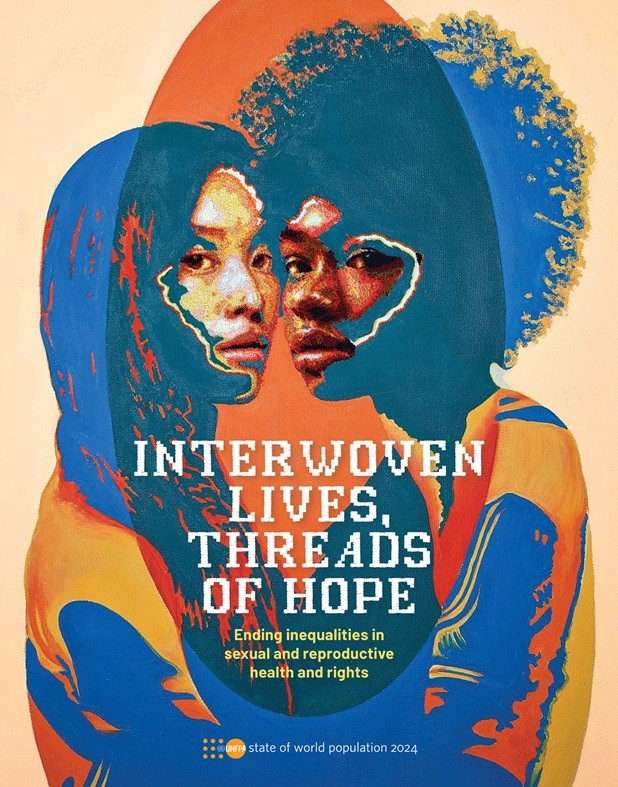
UNFPA: An ugly truth marred global gains in sexual and reproductive health rights
Latest
 |
| The report entitled “Interwoven Lives, Threads of Hope: Ending Inequalities in Sexual and Reproductive Health and Rights” by UNFPA. (Photo: UNFPA) |
Entitled “Interwoven Lives, Threads of Hope: Ending Inequalities in Sexual and Reproductive Health and Rights,” the report highlights the role racism, sexism, and other forms of discrimination continue to play in blocking broad gains in sexual and reproductive health for women and girls. The data are damning. Women and girls who are poor, belong to ethnic, racial, and indigenous minority groups, or are trapped in conflict settings are more likely to die because they lack access to timely health care:
An African woman who experiences pregnancy and childbirth complications is around 130 times more likely to die from them than a woman in Europe and Northern America.
Over half of all preventable maternal deaths are estimated to occur in countries with humanitarian crises and conflicts – that’s nearly 500 deaths per day.
Women of African descent across the Americas are more likely to die when giving birth than white women. In the United States, the rate is three times higher than the national average.
Women from indigenous ethnic groups are more likely to die of causes related to pregnancy and childbirth.
Women with disabilities are up to 10 times more likely to experience gender-based violence than their peers without disabilities.
People of diverse sexual orientation and gender expression face rampant violence and steep barriers to care.
This year marks the thirtieth anniversary of the International Conference on Population and Development in Cairo – a landmark moment in which 179 governments committed to placing sexual and reproductive health and rights at the core of sustainable development. But progress is in danger. Millions of women and girls remain far behind, and progress is slowing or stalled on key measures: 800 women die every day giving birth, unchanged since 2016; a quarter of women cannot say no to sex with their partner, and nearly one in 10 women cannot make their own decisions about contraception. In 40 percent of countries with data, women’s bodily autonomy is diminishing.
“In the space of a generation, we have reduced the unintended pregnancy rate by nearly one-fifth, lowered the maternal death rate by one-third, and secured laws against domestic violence in more than 160 countries,” said Dr. Natalia Kanem, UNFPA Executive Director. “Despite this progress, inequalities within our societies and health systems are widening, and we have not adequately prioritized reaching those furthest behind. Our work is incomplete but not impossible with sustained investment and global solidarity."
The evidence outlined in the report points to a troubling reality – access to contraceptives, safe birth services, respectful maternity care, and other essential sexual and reproductive health services is unreachable for too many women and girls. In Madagascar, the richest women are five times more likely than the poorest to have skilled assistance in childbirth. In Albania, over 90 percent of Roma women from the most marginalized socioeconomic groups had serious problems accessing health care compared with only five percent of ethnic Albanian women from the most privileged socioeconomic groups.
Improvements in health care access have primarily benefited wealthier women, and those who belong to ethnic groups that already had better access to health care. Women and girls with disabilities, migrants and refugees, ethnic minorities, LGBTQIA+ people, people living with HIV and disadvantaged castes all face greater sexual and reproductive health risks and also unequal access to sexual and reproductive health care. Their vulnerability is further compounded by powerful forces such as climate change, humanitarian crises and mass migration, which often have a disproportionate impact on women at the margins of society.
The report highlights the importance of tailoring programmes to the needs of communities – instead of large-scale, one-size-fits-all approaches – and empowering women and girls to craft and implement innovative solutions. It also calculates that if we spent an additional $79 billion in low- and middle-income countries by 2030, we would avert 400 million unplanned pregnancies, save 1 million lives and generate $660 billion in economic benefits.

















